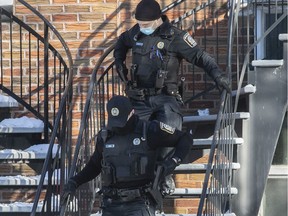Overhaul model for police financing, Quebec report urges
Police officers are often not those best qualified to deal with many of the calls they handle daily, the report says.

Article content
The cost of policing in Montreal is ballooning, but it’s not making the city any safer, says a new report that recommends investing more in mental health services, housing for the disadvantaged and early childhood education.
“Funding for public security is neither smart nor efficient,” said Roberson Edouard, lead author of the 22-page report by the Institut de recherche et d’informations socioéconomiques (IRIS) and the Observatoire des inégalités raciales au Québec (OIRQ), released Wednesday.
“Everyone, including municipal police chiefs, agrees that the funding model needs to be overhauled. Everyone realizes that there is a mismatch between where we are putting the money and where the needs are,” he added.
Public security is Montreal’s biggest expense, accounting for 17.7 per cent of the $6.46-billion 2022 budget. Two-thirds of that, or $724.1 million, goes to Montreal police.
In the past 20 years, police funding in Montreal has risen by 169 per cent, the study noted. Yet police officers are often not those best qualified to deal with many of the calls they handle daily, Edouard said.
“When there’s a person in distress, when someone is suffering from a mental health disorder, when an individual is having a crisis related to addiction, or when a homeless person needs help, we call the police,” he said.
“However, even the police themselves say that they are not competent to deal with such cases and that other interveners would do a better job.”
A CBC investigation in 2018 found that 70 per cent of people killed by police in Canada had mental health or substance abuse problems.
A study last year by Seattle found that nearly half of the 911 calls to police could have been handled without officers present, Edouard noted.
“Cities keep spending larger and larger sums on their police departments, while only investing modest amounts in social or community services,” the report stated.
There is no evidence that increasing police budgets makes citizens any safer from crime, Edouard said.
Despite the recent rise in gun crime, overall crime rates have been decreasing for decades, he said.
The crime rate across Quebec dropped by 36 per cent in the past decade, while in Montreal it decreased by 56 per cent in the past 20 years, the report said.
Edouard acknowledged the increase in gun crime is worrisome, but he blamed higher levels of government for failing to take stronger action to crack down on firearms, particularly handguns.
He called for massive investment in early childhood education and activities for at-risk youth to prevent them from being recruited into gangs.
In recent years, Montreal’s police force has distanced itself from the community policing model that led to the multiplication of neighbourhood stations in the 1990s.
On Jan. 6, Montreal police Chief Sylvain Caron, who will retire April 22, sparked controversy by stating that the only way to rein in the soaring cost of policing was to close more of the island’s 30 precincts.
However, Mayor Valérie Plante has said her administration stands by a moratorium adopted by city council on future police station closings and a pledge to hold public consultations before any other precincts are eliminated.
Edouard said that while the community policing philosophy, which brought police closer to citizens, was a step in the right direction, its weakness was in failing to address the often troubled relationship between police and marginalized groups.
“Even if you were to increase the number of police officers and adopt the community policing approach, it would certainly not alleviate the relationship and the tensions between the police and these groups,” he said.
“It won’t solve the problems of a young man from a disadvantaged neighbourhood who needs a community centre to keep busy. It won’t solve the problem of a homeless person who needs social housing to get off the street. It won’t solve the problem of a drug addict who needs a safe injection site to use drugs safely and not endanger the surrounding population.”
The report noted that Quebec City invests less than Montreal in policing but achieves comparable results.
“By redirecting some of the resources from public security to social and community services such as social housing, early childhood education and community services, cities would invest in crime prevention and reduce the risks of police interventions that go off the rails,” it recommended.








Postmedia is committed to maintaining a lively but civil forum for discussion. Please keep comments relevant and respectful. Comments may take up to an hour to appear on the site. You will receive an email if there is a reply to your comment, an update to a thread you follow or if a user you follow comments. Visit our Community Guidelines for more information.